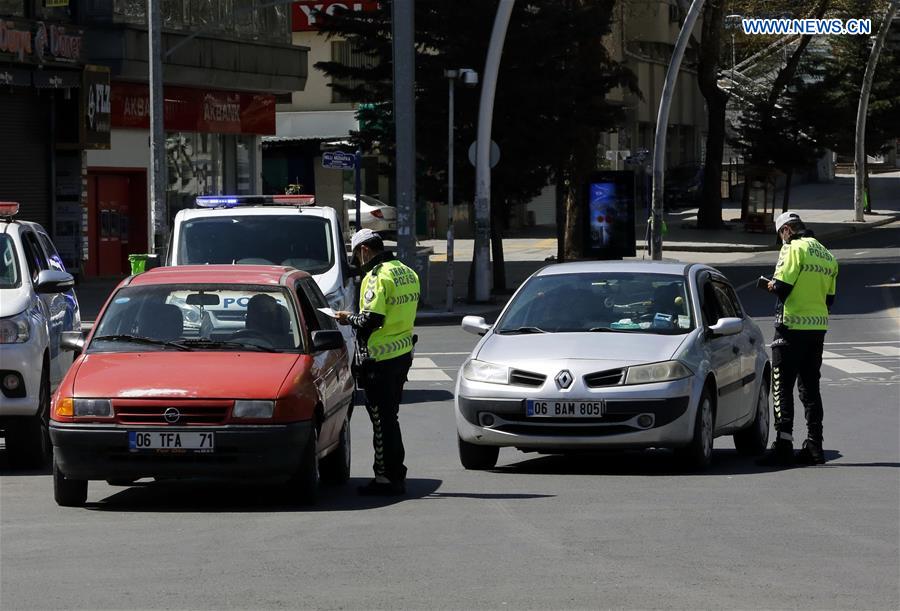
Policemen check vehicles on a road during a curfew in Ankara, Turkey, on April 18, 2020. (Photo: Xinhua)
ANKARA, April 23 (Xinhua) -- Turkey crossed a major threshold as the total COVID-19 cases exceeded 100,000 on Thursday, but the government mulls a plan to ease restrictions in early June to protect the vulnerable economy.
So far, Turkey has recorded 101,790 coronavirus cases, with a death toll of 2,491 deaths. The country has recently overtaken Iran to become the worst-hit country by the virus in the Middle East.
Despite the fast growth of infections, Turkish President Recep Tayyip Erdogan showed confidence in the country's health system, saying that, unlike Western nations, Turkey's hospitals still have the capacity to deal with the crisis due to a good health infrastructure with new investments.
In this context, the first phase of a new special hospital used for treating coronavirus patients was inaugurated on Monday in Turkey's biggest city of Istanbul, which has accounted for almost 60 percent of all cases nationwide.
Turkey will also produce 5,000 ventilators by the end of May, while two other pandemic hospitals are currently under construction in Istanbul.
Speaking on Monday evening following a cabinet meeting, Erdogan described his country's performance in handling the epidemic as "one of the world's most successful."
He insisted that despite the high number of infections, Turkey has one of the lowest fatality rates because the government acted "swiftly to impose restrictions" when the first infection was confirmed in mid-March.
Some experts argued, however, that the Turkish authorities only count the cases confirmed by test results, excluding the ones that have been clinically diagnosed as COVID-19 patients without receiving tests.
Alpay Azap, a virologist and member of Turkey's coronavirus advisory board, refuted the argument during a television interview, stressing that the official data was "transparent," noting that diagnosing COVID-19 can be difficult for some patients.
He added that unlike some hardest-hit European countries like Italy, Turkey has a relatively young population, leading to the low rate of fatalities.
Despite the spike in COVID-19 cases, Turkey plans to gradually ease the restrictions in early June, as the number of new cases appears to have flattened, said Erdogan.
Turkey aims to bring the pandemic outbreak to a level that would allow the normalization of life after the Eid al-Fitr, the holiday between May 23 and 26 in Turkey this year, which comes after the Muslim month of Ramadan.
Ankara has imposed a four-day full lockdown for 31 major cities this week until Sunday evening, but has shied away from ordering a nationwide curfew in an effort to protect the economy, which was already bruised before the outbreak from a recession triggered by a currency meltdown in 2018.
Turkey has put those under the age of 20 and over 65 under a strict curfew, and has shut schools and some shops, restricted travels, and adopted weekend curfews.
However, a preliminary research, made by five Turkish economists from Koc University and the University of Maryland, suggested that Turkey faces a 17-percent economic contraction if it maintains its current course, while the contraction will decrease to 7.8 percent if the country adopts an immediate full lockdown.
"When the full lockdown is delayed, it becomes harder to contain the pandemic. Thus, the lockdown will last longer and the economic costs increase," they argued in the research.
"We have to take into account everyone's needs and problems during this process, if everything goes as planned, we would see easing of the restrictions, the economy also needs this incentive to get back on track," a source close to the government told Xinhua.
"If the economy stops, the whole country will be affected, there is a delicate balance to be considered, like in all other countries hit by the epidemic," he spoke under the condition of anonymity.
The Turkish currency continued to decline, as the IMF warned that Turkey risks entering a second recession in less than two years with a 5-percent contraction this year.
On Tuesday, Turkey imposed additional taxes of up to 45 percent on a wide range of industrial goods from cars to electronics, to protect local producers from competition.
The health of the Turkish economy is vital for Erdogan, whose approval rate increased to 55.8 percent in March from 42.1 percent in February, according to a survey conducted by Turkish pollster Metropoll.


